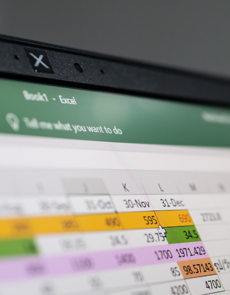ERP vs MRP - all you need to know
A complete guide outlining the differences between ERP and MRP systems to help you understand what solution best suits your business.
Both MRP (Material Requirements Planning) and ERP (Enterprise Resource Planning) systems are pieces of software that help you run your business through smart forecasting and your chosen business priorities, but MRP has a purely manufacturing focus as opposed to ERP, which spans across a business as well as supply chain management.
However Manufacturing ERP software does exist for an ERP system specifically tailored to the manufacturing industry.
But what do ERP and MRP do, and which is the appropriate solution? Does one size really fit all? And how hard are they to implement?
To give you a better understanding of the components of each, and to help give you an overview of both of the systems, we've set out some of the key characteristics below.
ERP and MRP are essential to businesses that are growing or are already beyond the shared premises/lock-up stage. As we discussed in another blog, lack of visibility, human error, delivery failures and lack of clarity over what is happening on the shop floor are inefficient, they drag on profitability and are ultimately born from a lack of controls.
Manual, usually spreadsheet-based, systems rely on accurate recording of data. These manual processes are time-consuming and vulnerable to distraction; business owners and busy managers have a thousand calls on their time, which can lead to delays in recording information, or even missing it completely. And even the best-kept records cannot do anything more than provide a partial picture, which is out of date the moment it is recorded.
Recognising the reality of a problem is the beginning of remedy. Acknowledging the need to upgrade management systems is a major step on the road to improvement.
What is MRP and what does it do?
MRP software allows the complete control and effective management of stock, work in progress, OEE, purchasing and manufacturing.
MRP purely focuses around the manufacturing cells of a business and is designed with users from these departments in mind. A manufacturing business would use an MRP system to manage its production planning, using it to forecast and order materials in the right volumes to arrive on the appropriate date. It can also integrate with suppliers’ databases via APIs, enabling supply chain management.
For more information, read our article 'What is a Material Requirement Planning (MRP) System?'
Right-sizing systems
A well-sorted and right-sized MRP is the basis for competitive management. It facilitates controlled, transparent and more effective ordering and avoids overstocking, better management of inventory and making working capital available for useful deployment in productive activities. It is a great pressure release for owners and managers.
I was under enormous pressure, working long hours before we had Access MRP. I would estimate that it has taken probably 40%-50% of that pressure off me.
MRP can take over a lot of routine but essential work and do it faster, more efficiently and more accurately. With the rise in legislation and liability litigation, an MRP’s traceability function, which can follow every single component through the manufacturing process, is really an essential for all businesses, now.
Similar to a manufacturing inventory management system, an MRP system provides much more data on shop floor activity and job costing, with better visibility. Activity is logged through touch screens at workstations. OEE technology collects data on machine downtime, which can be refined with data on unproductive work and scrap levels. Product drawings, images and training information are available on the system to staff who need them. Purchase orders and invoices can be raised, matched and managed automatically.
Control without fear
Among the chief reasons why businesses do not invest in automation and management systems is fear. A business is under enough strain to keep operating without going down while new IT systems are installed; anyone who has been involved in manufacturing for more than a few years will have heard horror stories of interminable installation processes, vendor staff on site semi-full time for months, and frequent breakdowns, need for upgrades and patches, and so on.
Many of those horror stories were based on fact. However, they are also in the past.
Watch the Kirkstall Precision Engineering case study video to see how they transformed itself from a small family-run business to a leading supplier for global household names using Access FactoryMaster, our MRP software.
What is ERP and what does it do?
An ERP system is a modular piece of software that consolidates the information you require to run your business and provides you and your teams with the tools to operate at an optimum level in all areas. All departments are integrated into the one system, and therefore a customer’s journey through your company is completely transparent, providing you with real-time costs and status updates to run your business effectively, as well as customers with automated real-time updates.
ERP systems go beyond MRP. ERP will include CRM (customer relationship management), SCM (supply chain management), estimation/quotation, product configuration (including bill of materials - BoM), project and providing inventory management, scheduling, shop floor data collection (SFDC), purchasing and other modules.
For more information, read our article on 'What is ERP and what does it do?'
Comprehensive control
ERP is a truly comprehensive system, covering all aspects of the business and is an indispensable tool for growing and more complex businesses that deploy it effectively. It is more expensive than MRP but it has a broader scope and can help to deliver savings in inventory and improvements in efficiency that mean that it pays for itself many times over.
Access ERP is helping us meet our target of filling 97% of all orders while reducing stock levels by £200,000.
But a word of caution.
Too much IT can overwhelm an enterprise. Gartner Research described a business trying to go from paper-based systems to full-on ERP as like standing on a railway platform and trying to board an express train while it hurtles through the station at 150mph. Smaller businesses must be prepared and must work up to highly sophisticated management systems – and a lot of them will never need very high-level IT.
Here at Access, we can support you with a cloud ERP system so you can track your KPIs and run reports from anywhere in the world to enable real-time business decisions to be taken from any internet-enabled device.
Watch the video of Martin's Rubber to find out how they are seeing the benefits of advanced planning and scheduling on the shop floor after integrating Access ERP.
Want to know more?
Gain a deeper understanding of the differences between MRP and ERP software.
What are the key differences between ERP and MRP systems?
ERP systems integrate every piece of the complex jigsaw that makes up a manufacturing business. Data from one part of the business can accurately inform decisions taken elsewhere. An ERP system will give you control across the whole process, from the supply of raw material to the logistics of delivery. An MRP module is a crucial component of ERP systems, but it is not the sole focus of the solution.
MRP software, however, is a tool largely used by production and operations teams to manage the manufacturing and purchasing areas of the business for efficiency gains. It enables the manufacturing facility to meet customer demands whilst meeting stocking KPIs and purchasing economically. MRP is a stand-alone item of software, so that whilst other departments can use the data, the data will not be linked to their databases. Whilst MRP systems can often be integrated into other software through imports and exports of relevant data, an ERP is developed with complete integration in mind.
| Team | ERP | MRP |
| Engineering team |
|
|
| Production team |
|
|
| Operations team |
|
|
| Sales team |
|
|
| Finance team |
|
|
| Senior team |
|
|
Which system is right for you?
If your objective is supply chain management, an ERP system will give you the tools to achieve absolute control across the whole process. Most ERP systems on the market now are modular, which means that you can select which areas (departmental workflows) to integrate and therefore which modules are required. In addition, when working with Access the implementation can be staged, with the core modules purchased and integrated first as some businesses simply don’t need every module.
For those businesses that already have software in place for customer-facing processes such as estimating, sales order processing and debtor management but lack supplier and stock management and production control, MRP would be the sensible choice. Equally, if you do not have the budget for a full (or partial) ERP system, but manufacturing control is a critical business requirement, then MRP may be the right solution for you. Learn more about manufacturing software to help you make your decision.”
Systems now available from Access are designed to be much simpler to install and to be up and running, and making a positive contribution to the business, within an accounting period.
Download our free MRP vs ERP whitepaper to understand more which system is right for you.
Critical questions when deciding: an ERP or MRP system?
The best way of ensuring that you are choosing the right software for your business would be to talk to an expert, and Access has some of the most experienced, knowledgeable people from industry on our teams. Our UK ERP software consultants have worked with countless manufacturers to help to put them on track towards a more profitable (not to mention less stressful) future.
Talk to an expert using our live chat at the bottom of the screen or submit your details here and we'll get in touch with you very soon.
It is always helpful to already have in your mind some of the things we are likely to ask you about. The key questions that we will need to understand to be in the best position to help you, are:
- Which business processes do you wish to automate and manage centrally?
- What software solutions do you currently have in place, and are you happy with them?
- What is your budget?
If you're not yet ready to chat to an expert, download the MRP brochure or visit our ERP software page to keep researching what's best for your business.







